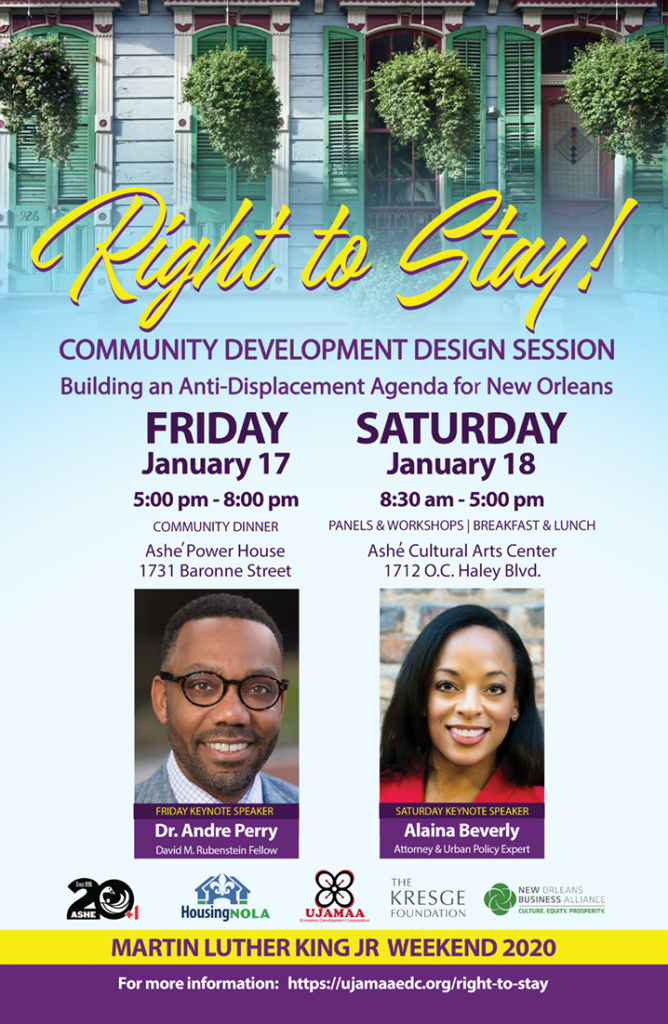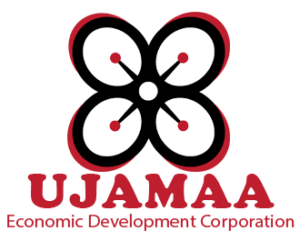Community Development Design Session
Building an Anti-Displacement Agenda for New Orleans
January 17-18, 2020
Current global urbanization trends sees populations moving from rural and suburban areas to cities at ever-increasing rates, often resulting in new groups of more affluent residents moving into once underinvested and predominately-poor communities. Accompanying development and reinvestment is typically marked by sharp increases in housing prices that almost invariably displace a neighborhood’s longtime residents. In recent years, as growing numbers of Americans opt for urban lifestyles, the gentrification rates in our 50 largest cities have more than doubled, with large-scale displacement occurring in 39 of them. Those cities’ gentrifying census tracts gained an average of 404 white, 97 Latino, and 62 Asian, while losing 593 black residents. In New Orleans’ Claiborne Corridor census tracts have lost an average of 1075 black residents, while gaining 120 white, 56 Latino, and 5 Asian residents.
We are committed to solving the issue of displacement in our city’s most vulnerable neighborhoods. As catalytic reinvestment occurs in communities that have for decades been subject to harmful local, state, and federal public policy—from redlining to urban renewal—the residents of these traditionally disinvested areas now find themselves facing rapid rates of removal from the places where they managed to create family, culture, and heritage in spite of blatant economic disempowerment. Greater New Orleans Metro Region has an unemployment rate of 6.4% and Orleans Parish has a rate of 7.1%, while Claiborne Corridor faces 38% unemployment. The per capita income is 73% the regional and 33% the national average, and housing costs are wildly disproportionate; 72% of renters and 62% of owners are cost-burdened, paying more than 36% of their income on housing costs, a third of them paying over 50%.
This one day convening presented by Ujamaa Economic Development Corporation builds on the growing coalition of community experts who focus their anti-displacement strategies with models of how to “gentrify in place” — our communities have the right to stay in place and reap the benefits of improvements in their neighborhoods. A major goal of this solutions-based gathering is to continue growing the vocabulary and tools of residents and neighborhood grassroots organizations around the policies which affect affordability, development, and opportunity. Ujamaa EDC has already seen our cultural community strengthen their efforts by communicating their needs in the language that investors and policymakers understand. There is value in a shared community voice, and an even greater value when community and its partners agree on the terms.
Panelists will include representatives of PolicyLink, Greater New Orleans Housing Alliance, Crescent City Community Land Trust, Mayor’s Office of Economic & Community Development, Finance Authority of New Orleans, University of New Orleans Urban Planning, New Orleans Redevelopment Authority, and the New Orleans Business Alliance.
▪ Attorney Alaina Beverly is an expert in urban policy, politics, civil rights, and community mobilization with over 15 years of experience in strategic planning, government relations, civic engagement, and program management. Currently, she is the Assistant Vice President for Urban Affairs at the University of Chicago Office of Federal Relations. Most notable, prior to joining the University, she was the Associate Director for the first-ever White House Office of Urban Affairs for the Obama Administration.

PANELS
PANEL 1: How Did We Get Here?
Discussion of the history and the current facts on the ground regarding displacement in New Orleans.
Moderator: Dr. Andre Perry -Fellow, The Brookings Institution; Panelists: Nicole Barnes, Executive Director, Jericho Road Episcopal Housing Initiative; Flozell Daniels, Jr., Board Member, Ujamaa Economic Development Corporation and CEO & President of Foundation for Louisiana (formerly Louisiana Disaster Recovery Foundation); Fred Johnson, Jr. , Board Member, Ujamaa Economic Development Corporation and CEO, New Orleans Neighborhood Development Foundation; Allison Plyer, Chief Demographer, The Data Center; Vincent Sylvain, Publisher, New Orleans Agenda
PANEL 2: Where Do We Go From Here?
Discussion of examples and best practices locally and nationally for mitigating displacement. Moderator: Andreanecia Morris, Executive Director, HousingNOLA; Panelists: Alaina C. Beverly, Assistant Vice President for Urban Affairs, Office of Federal Relations | Office of Civic Engagement, The University of Chicago; Brenda Breaux, Executive Director, New Orleans Redevelopment Authority;
Maxwell Ciardullo, Director of Policy & Communications, Greater New Orleans Fair Housing Action Center; Julius Kimbrough, Executive Director, Crescent City Community Land Trust; Kristin Gisleson Palmer, New Orleans City Councilwoman, District C ; Kelsy Yeargain, Executive Director, Tulane/Canal Neighborhood Development Corporation
PANEL 3: Commercial Corridor Development
Discussion on inter-generational wealth building as a key component of anti-displacement strategies. Share best practices locally and nationally. Moderator: Judith Dangerfield, Board Chair, Ujamaa Economic Development Corporation, CEO/Principle, MetroSource, LLC. Panelists: Ryan Albright, Director, Strategic Neighborhood Development, New Orleans Business Alliance; Hannah Adams, Staff Attorney, Southeast Louisiana Legal Services; Gina Charbonnet, Principle, GeChar Entertainment (CDF Cohort 1)*; Damon Burns, President & CEO, Finance Authority of New Orleans; Gina Charbonnet, Principle, GeChar Entertainment (CDF Cohort 1)* Edgar Chase, IV – Board Member, Ujamaa Economic Development Corporation; President, Chase Hospitality Group; Chuck Morse, Executive Director, Thrive New Orleans; LaShaunda Pickett-René, Assistant Vice President, Manager of Programs and Business Services for Louisiana, TruFund Financial Services, Inc. (CDF Cohort 2)*; Jon Renthrope, Owner Cajun Fire Brewery; CEO, New Orleans East Cultural Hub (CDF Cohort 1)*
